
Alien: The Roleplaying Game is a science fiction horror role-playing game based on the Alien film franchise. It was published by Free League Publishing in 2019. The game has won three ENNIE Awards.

Alien: The Roleplaying Game is a science fiction horror role-playing game based on the Alien film franchise. It was published by Free League Publishing in 2019. The game has won three ENNIE Awards.
Alien is a role-playing game set in space in the far future that has two modes:
The game box comes with a large 392-page softcover book of rules, a Cinematic adventure titled "Chariots of the Gods", two sets of custom dice, a gamemaster's screen, and a deck of 50 custom cards. [2]
Players use a point-buy system to create characters, choosing from classes like frontier colonist, space trucker, colonial Marine, and company rep. They then buy specialized equipment from a pool of money. [2]
Although there may be conflict with human or android non-player characters, the major opponents are the titular aliens, known within the game as "xenomorphs". There are many different types, each with special and deadly attacks that can overwhelm a single character or even a band of well-trained and well-armed marines. As critic Patricio Kobek noted, "players are not at the top of the food chain. They are, in every sense, the prey." [2] However, Kobek noted that players should resist the temptation to create a combat-focused character, pointing out that "thirst, starvation, exhaustion, the vacuum of space, freezing, falling, explosions, fire, disease, radiation, drowning and synthetics are but a few of the other common ways to meet your end." [2]
The game mechanics use a simple system of rolling several six-sided dice to resolve actions. If the player rolls a six on any of the dice, the character is successful. [1] The more difficult the action, the fewer dice the player rolls, making rolling a six more unlikely. Panic and stress dice can modify possible successes or failures. [3]
The film Alien was released in 1979, and was followed by several other movies in the franchise. In 2019, a team of game designers including Brandon Bowling, Paul Elliott, Andrew E. C. Gaska, Tomas Härenstam, Nils Karlén, Kosta Kostulas, Dave Semark, and Matthew Tyler-Jones created Alien: The Roleplaying Game, which was then released by the Swedish publisher Free League.
The game was released in December 2019. [4]
Patricio Kobek, writing for The Gamer, commented that "Diehard fans of the original sci-fi space horror [movie] will immediately recognize the mood in this tabletop adaptation [...] it is as great as it is terrifying." He complimented the game for being able to "replicate this initial feeling of dread and the unknown in confined spaces, in this case in space, with players taking on a diverse cast of characters who do not always get along. Unlike Dungeons & Dragons , combat is the last thing one should seek out against the Alien, as it can rip through an unprepared party with little effort." Kobek concluded, "players who know what the Alien series entails from the original films will find the experience familiar, satisfying, and overall created with care and passion towards the source material." [2]
Richard Jansen-Parkes, writing for Dicebreaker, was very impressed that this game was able to evoke the "creeping, slithering fear of the unknown" from the original movie. He noted that "Whether you’re running a one-off scenario as a bunch of hapless space-truckers or building an entire campaign for a band of roving explorers, the game excels at keeping the tension climbing to unbearable levels. When things are at their most fraught and unbearable, you can expect something terrible to happen." He liked the "nice and simple" core rules, and admired the stress dice mechanic, calling it "a great system that does an impressive job of cranking up the tension as the game builds towards its finale." He concluded, "If you dim the lights, stick some industrial clanging on the speakers and grab some friends for the evening you’re set up for something truly great." [1]
Eeknight reviewed Alien: The Roleplaying Game for Black Gate , and stated that "The game itself is simple to understand yet is role-play heavy enough that seasoned gamers will enjoy it. I'll go a step beyond and say this would be an excellent game for introducing someone who has never played a tabletop roleplaying game to the hobby." [3]
Alien: The Roleplaying Game won the 2020 Gold ENnie Award for Best Game. [5] ALIEN RPG: Building Better Worlds won the 2024 Gold ENnie Award for Best Supplement and the Silver for Best Cartography. [6]

Call of Cthulhu is a horror fiction role-playing game based on H. P. Lovecraft's story of the same name and the associated Cthulhu Mythos. The game, often abbreviated as CoC, is published by Chaosium; it was first released in 1981 and is in its seventh edition, with licensed foreign language editions available as well. Its game system is based on Chaosium's Basic Role-Playing (BRP) with additions for the horror genre. These include special rules for sanity and luck.
Dream Pod 9 (DP9), formerly Ianus Games, is a Montreal-based Canadian game publisher. Its most notable products are Heavy Gear, Jovian Chronicles, Tribe 8, and Gear Krieg, as well as the Silhouette role-playing game system.

Fate is a generic role-playing game system based on the Fudge gaming system. It has no fixed setting, traits, or genre and is customizable. It is designed to offer minimal obstruction to role-playing by assuming players want to make fewer dice rolls.

Conspiracy X is a role-playing game (RPG) originally released by New Millennium Entertainment in 1996, and since revised and released by several publishers including Steve Jackson Games and Eden Studios, Inc. In all versions, the setting posits that aliens are insiduously taking over the world, reminiscent of The X-Files.

Eclipse Phase is a science fiction horror role-playing game with transhumanist themes. It was originally published by Catalyst Game Labs, and is now published by the game's creators, Posthuman Studios, and is released under a Creative Commons license.

Fiasco is a role-playing game by Jason Morningstar, independently published by Bully Pulpit Games. It is marketed as a "GM-less game for 3–5 players, designed to be played in a few hours with six-sided dice and no preparation". It is billed as "A game of powerful ambition and poor impulse control" and "inspired by cinematic tales of small time capers gone disastrously wrong—films like Blood Simple, Fargo, The Way of the Gun, Burn After Reading, and A Simple Plan."
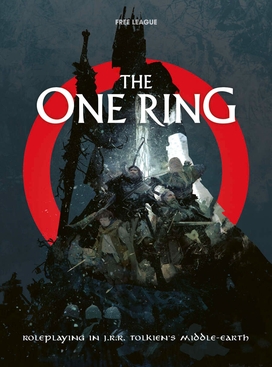
The One Ring Roleplaying Game is a tabletop role-playing game set in J. R. R. Tolkien's Middle-earth, set at the time between The Hobbit and The Lord of the Rings. Designed by Francesco Nepitello and Marco Maggi, the game was initially published by Cubicle 7 in 2011 under the title The One Ring: Adventures over the Edge of the Wild. Cubicle 7 continued to publish the first edition of the game until 2019. Nepitello and Maggi developed the second edition, which is published by Free League Publishing under the same title, The One Ring Roleplaying Game.
The Star Wars Roleplaying Game is a tabletop role-playing game set in the Star Wars universe, first published by Fantasy Flight Games in 2012. It consists of different standalone cross-compatible games where each one is a separate themed experience. The sourcebooks support games set from the Clone Wars era to the original Star Wars trilogy era; there is limited support for the Star Wars sequel trilogy era. Since 2020, the game line has been maintained by Asmodee's subsidiary Edge Studio.

Powered by the Apocalypse (PbtA) is a tabletop role playing game design framework developed by Meguey Baker and Vincent Baker for the 2010 game Apocalypse World and later adapted for hundreds of other RPGs.
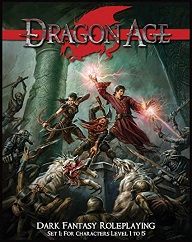
Dragon Age is a role-playing game published by Green Ronin Publishing in 2010. It is based on the Dragon Age video game series by BioWare, and uses the video game series' setting.

Aliens Adventure Game is a combat-oriented role-playing game published by Leading Edge Games in 1991.

Roll20 is a website consisting of a set of tools for playing tabletop role-playing games, also referred to as a virtual tabletop, which can be used as an aid to playing in person or remotely online. The site was launched in 2012 after a successful Kickstarter campaign. The platform's goal is to provide an authentic tabletop experience that does not try to turn the game into a video game, but instead aids the game master in providing immersive tools online. The blank slate nature of the platform makes integrating a multitude of tabletop role-playing games possible.
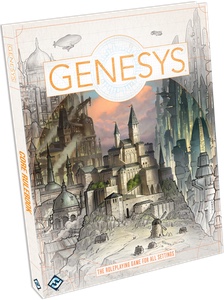
The Genesys Roleplaying Game is a tabletop role-playing game released by Fantasy Flight Games in November 2017. The book presents a generic version of a narrative dice system introduced previously in Fantasy Flight Games' Star Wars RPG, opening the system to be used in any type of setting.
The Cortex System is a collection of related roleplaying games. Its most recent iteration, Cortex Prime, was designed by Cam Banks and initially published by Fandom Tabletop, then acquired by Dire Wolf Digital. Prior versions appeared in the licensed roleplaying games published by Margaret Weis Productions, where it was used as the house system. Cortex is an adaptable game system focusing on characterization and story development.

City of Mist is an urban fantasy neo-noir detective tabletop role-playing game (RPG) designed by Amít Moshe and published by Son of Oak Game Studio. The game is set in a modern-day metropolis where ordinary people of all walks of life become modern-day reincarnations of myths, legends, and fairy tales, gaining magical powers and abilities.
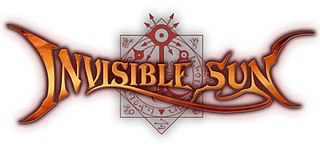
Invisible Sun is a surrealistic modern fantasy tabletop role-playing game written by Monte Cook, published in 2018.
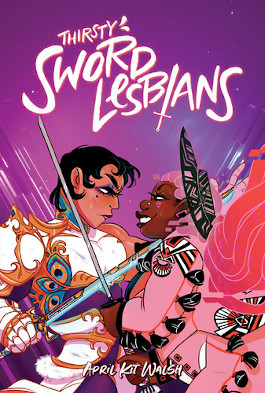
Thirsty Sword Lesbians is a narrative-focused tabletop role-playing game that emphasizes telling "melodramatic and queer stories". The game was funded via a 2020 Kickstarter campaign and published by Evil Hat Productions in 2021. It uses a modification of the Powered by the Apocalypse game system.

Ironsworn is an indie role-playing game written and self-published by Shawn Tomkin. Its Ironlands setting is low fantasy, set in a rugged frontier. The game received the 2019 ENNIE Gold Winner Award for Best Free Game/Product. Rob Wieland for Forbes named Ironsworn one of his favorite RPG products of 2022 and one of the best fantasy tabletop role-playing games for solo play.

Kids on Bikes is a tabletop role-playing game system, and a series of games that use that system. It has won multiple ENNIE Awards.
Free League Publishing is a game studio and publisher based in Stockholm, Sweden, formed in 2011. The company designs and publishes tabletop role-playing games, board games, and books based on licensed properties and independent works.